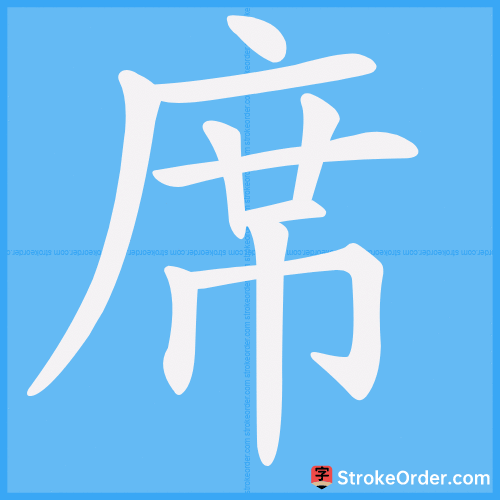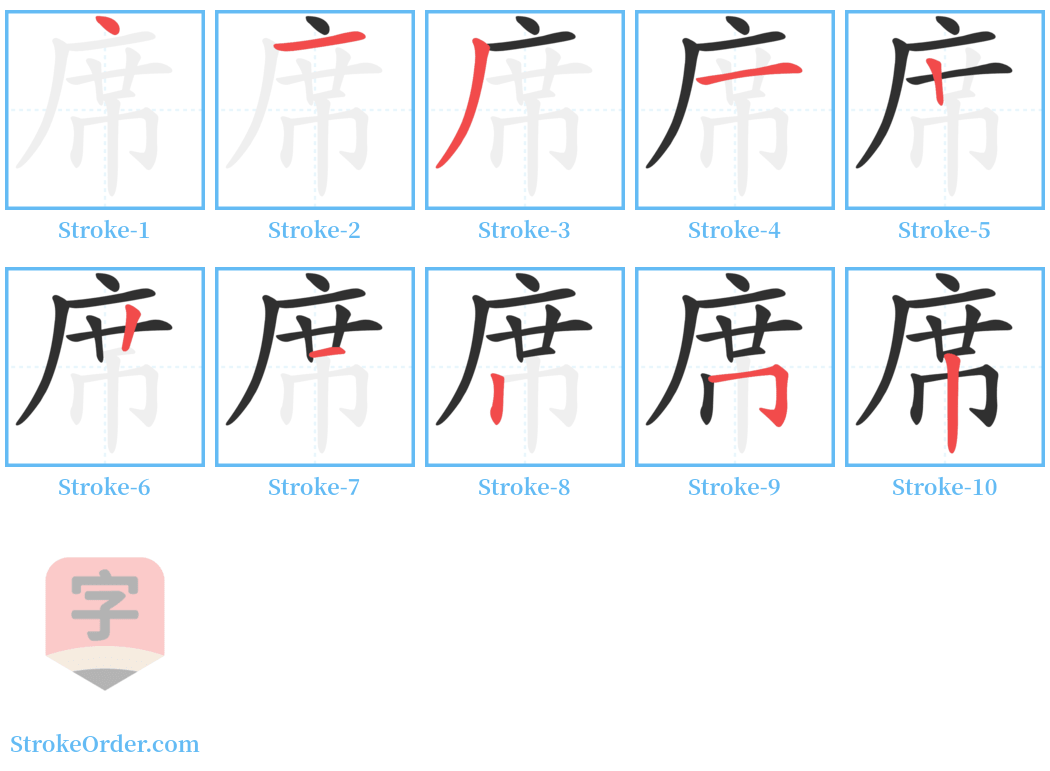席 Stroke Order
Animated Stroke Order of 席

Stroke Order Diagrams for 席

Step-by-Step Handwriting Guide for 席

Learn to Write Chinese Characters with Video Tutorials
Watch the video of writing the Chinese character "席", learn the correct stroke order (笔顺) of the character "席", and master the standard way of writing the character "席".
Free Printable Handwriting Practice with Stroke Order: 席
Printable Writing Practice Worksheet of "席" in Portrait Orientation (Tian Zi Ge)

Printable Writing Practice Worksheet of "席" in Landscape Orientation (Tian Zi Ge)

Information of 席
Pinyin
xí
Radical
巾
Strokes
10 strokes
Usage
★★★★★
Definition
banquet / woven mat / seat / place, woven mat
席
xí
名
1. 用草或苇子编成的成片的东西,古人用以坐、卧,现通常用来铺床或炕等。
(A mat made of grass or reeds, used by ancient people to sit or lie down, now commonly used as bedding or on a heated bed.)
2. 座位。
(Seat.)
3. 酒筵,成桌的饭菜。
(A banquet; a table of dishes.)
4. 特指议会中当选的人数。
(Specifically refers to the number of elected representatives in a council.)
5. 职位。
(Position.)
6. 量词。
(Measure word.)
7. 姓。
(A surname.)
用草或苇子编成的成片的东西,古人用以坐、卧,现通常用来铺床或炕等:~子。草~。苇~。竹~。凉~。~地而坐。~卷( juǎn )。
(A mat made of grass or reeds, used by ancient people to sit or lie down, now commonly used as bedding or on a heated bed: mat; grass mat; reed mat; bamboo mat; cool mat; to sit on a mat; mat roll.)
座位:~位。~次。出~。列~。
(Seat: seat position; seating order; to leave one’s seat; line up seats.)
酒筵,成桌的饭菜:筵~。宴~。酒~。
(Banquet; a table of dishes: banquet; feast; drinking feast.)
特指议会中当选的人数:四~。
(Specifically refers to the number of elected representatives in a council: four seats.)
职位:主~。西~(塾师)。
(Position: main position; west position (tutor).)
量词:一~酒。
(Measure word: one banquet.)
姓。
(A surname.)
席
xí
名
【本义】:供坐卧铺垫的用具。后又曾写作“蓆”。
(Original meaning: an object used for sitting or lying on; later also written as "蓆".)
【造字法】:“蓆”的古字。会意。从巾,庶省声。天子诸侯的席有刺绣镶边,故从巾。席用来待广大宾客,故从“庶”省。
(Charactercrafting: the ancient character for "蓆". A compound character. It consists of “巾” (cloth) and a variant of the sound “庶”. The seats of the emperor and feudal lords are bordered with embroidery, hence the use of "巾". The seat is used for hosting many guests, hence the use of “庶”.)
引
1 《说文》:席,藉也。礼天子诸侯席有黼绣纯饰。按,即筵也。方幅如巾,故从巾。
(From “Shuowen”:席, a mat. The etiquette for the emperor and lords involves ornate embroidered decoration. It is indeed a banquet, as the shape is like a cloth, hence the use of “巾”.)
2 《周礼·司几筵》:设莞筵纷纯,加缫,席画纯。疏:“初在地者一重,谓之筵。重在上者,即谓之席。”
(From “Zhouli”: Arrange mats and set up a lavish banquet, adding silk to the pure cloth. Commentary: "The initial layer on the ground is called a banquet. The layer above it is called a seat.")
3 设之曰筵,坐之曰席。——《礼记·祭统》注
(Set it up as a banquet, sit on it as a seat. — Commentary from "Liji" on sacrifices.)
4 《诗·邶风·柏舟》:我心匪席,不可卷也。
(From "Shijing": My heart is not a mat, it cannot be rolled up.)
5 《玉台新咏·古诗为焦仲卿妻作》:结发同枕席。
(From "Yutai Xinyong": We share the same bed since our hair was tied.)
6 唐· 李白《梦游天姥吟留别》:觉时之枕席。
(Tang dynasty, Li Bai: Awakening from my slumber, on my pillow and mat.)
7 清· 方苞《狱中杂记》:席地而卧。
(Qing dynasty, Fang Bao: Sleeping on the ground.)
8 清· 方苞《左忠毅公逸事》:席地倚墙。
(Qing dynasty, Fang Bao: Leaning against the wall on the ground.)
例
又如:席包(以苇席或高粱篾席制的包);席具(铺垫用具);席户(悬席为户。比喻房子的简陋);席号(以草席搭建的临时棚屋);席荐(席子与草荐,都是草编的坐卧用具)
(Examples: mat bag (a bag made from reed mat or sorghum mat); mat tools (tools for padding); mat house (house with a hanging mat as a door, metaphorically referring to simplicity); mat number (a temporary shed built from a mat); mat boards (both a mat and a grass mat are objects used for sitting or lying down.)
席
xí
名
1. 座位;席位 ([En.] place;seat)
(Seat; place.)
引
1 《孔子家语》:席而无上下,则乱于席次矣。
(From "Kongzi Jiayu": If there is no distinction in seating, then the seating order is in chaos.)
2 《虞初新志·秋声诗自序》:变色离席。(大惊失色离开座位)。
(From "Yuchu Xinzhi”: Changes in color, leaving the seat in alarm.)
例
又如:席舍(贡院中的试场座位、考舍);席尊(首席);上席;下席;硬席;专席;来宾席;被告席
(Examples: examination seat in the tribute hall; main seat; upper seat; lower seat; hard seat; reserved seat; guest seat; defendant's seat.)
2. 成桌的饭菜,酒筵 ([En.] banquet;feast)
(Banquet; a table of dishes.)
引
1 《史记·魏其武安侯列传》:饮酒酣,武安起为寿,坐皆避席优。
(From "Shiji": As the wine flowed, Wuan stood up to offer a toast, and all took care to avoid the seating hierarchy.)
2 《仪礼·燕礼》:所赐者兴,受爵,降席下,奠爵,再拜稽首。郑玄注:“席下,席西也。”
(From "Yili": What is given rises, the noble receives the seat, bows and nods his head. Zheng Xuan's commentary: "下 indicates the rank below them in seating.")
例
又如:席尊(指主持酒席的人);席面(宴席上与主人对席的客位);流水席;还席
(Examples: host of the banquet; the guest position at the banquet facing the host; flowing banquet; returning the mat.)
3. 职位 ([En.] post)
(Position.)
引
1 《旧唐书·房乔传》:常恐诸子侈席势凌人。
(From "Old Tang History": Always fearing that the sons will abuse their positions and oppress others.)
2 《负曝闲谈》:这钱谷一席,有个小徒很过得去,可以叫他来效劳。
(From "Fu Ba Xian Tan": This position in charge of finances has an apprentice who works well enough, can call him to assist.)
3 唐· 刘禹锡《赠杨尚书》:步武离台席,徊翔集帝梧。
(Tang dynasty, Liu Yuxi: To leave the platform of authority and scatter like a flight of birds.)
4. 旧称所司职务为席,如管刑名的幕宾称刑席,管钱谷的称钱席;教师称教席 ([En.] position)
(Formerly referred to specific official positions, such as the assistant overseeing legal matters called "刑席", overseer of financial matters called "钱席"; a teacher referred to as "教席".)
引
1 《文明小史》:每一个人替他们安置一席,倒也不难。
(From "A Brief History of Civilized Society": It is not difficult to arrange a position for each person.)
5. 船帆 ([En.] sail)
(Sail.)
引
1 杜甫《早发》:早行篙师怠,席挂风不正。
(Du Fu: In my early journey, the boatman was lazy, and the sail hung incorrectly.)
6. 姓
(A surname.)
席
xí
动
1. 铺席,登席就坐([En.] cover with a mat)
(Cover with a mat; to take one's seat.)
引
1 《仪礼·乡饮酒礼》:乃席宾。
(From "Yili": And then seat the guests.)
2 《论语》:必正席,先尝之。 皇疏:“犹坐也。”
(From "Lunyu": Must arrange the seat properly before tasting. The Emperor's commentary: “It is akin to sitting.”)
3 《仪礼·特性馈食礼》:席于门中。
(From "Yili": Mat inside the door.)
4 《左传·宣公十二年》:赵旃夜至于楚军,席于军门之外。
(From "Zuo Zhuan": Zhao Zhan arrived at the Chu army at night, sitting outside the army gate.)
2. 凭借,倚仗 ([En.] depend on; rely on)
(Depend on; rely on.)
引
1 《汉书·刘向传》:吕产、吕禄席太后之宠。
(From "Han Shu": Lü Chan and Lü Lu relied on the favor of Empress Dowager.)
3. 垫,压 ([En.] pad; press down)
(Pad; press down.)
引
1 班固《汉书》:相枕席于道路。
(From "Han Shu": They leaned on each other as they lay on the road.)
量
用于表示酒席的数目。如:办了三席酒;一席话
(Used to indicate the number of banquets. For example: held three banquets; one conversation.)
Input Method for 席
Pinyin
xi2
Wubi
yamh|oamh
Cangjie
itlb
Zhengma
tgel
Four Corner
00227
Unicode
U+5e2d
Same Pronunciation Characters